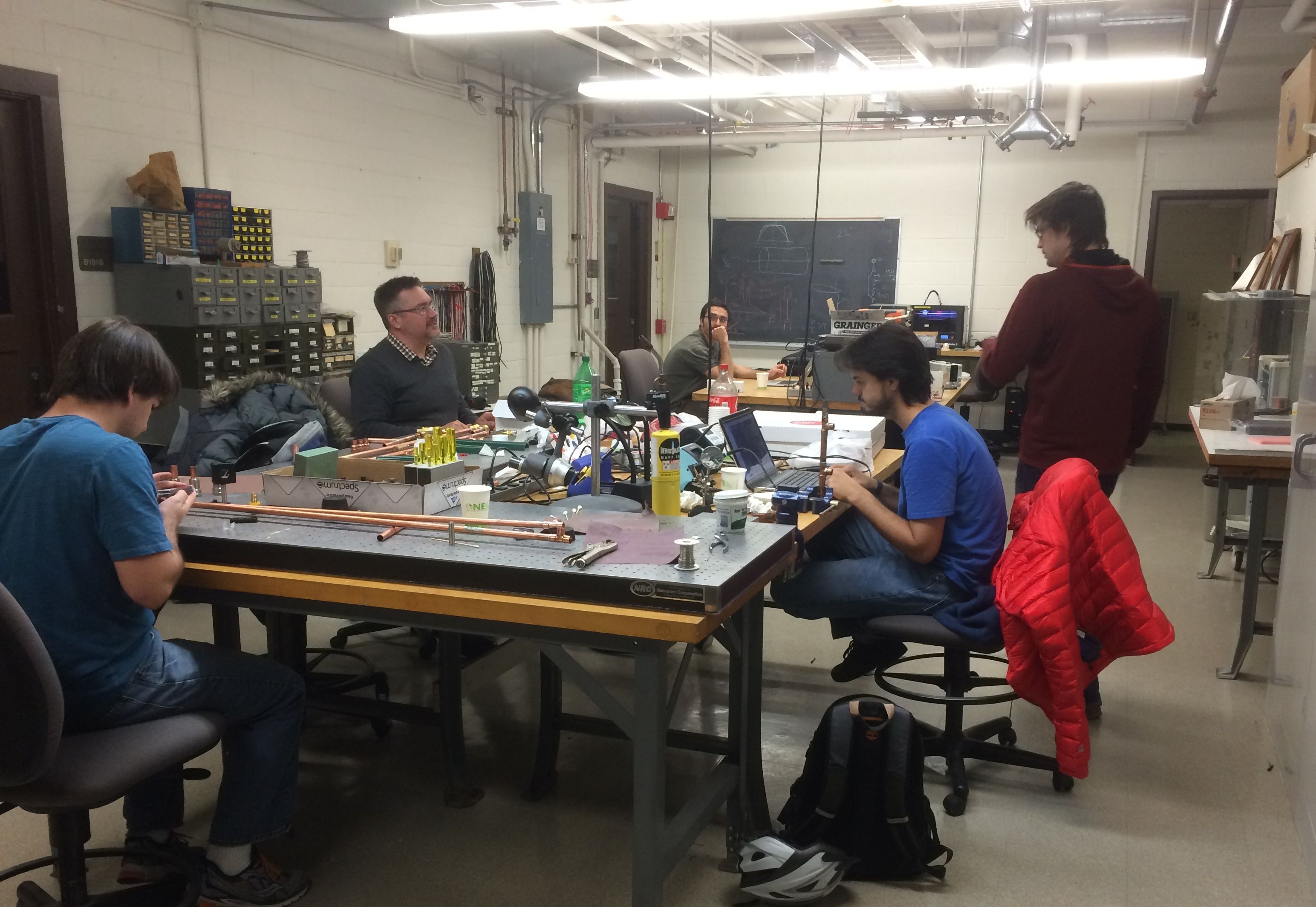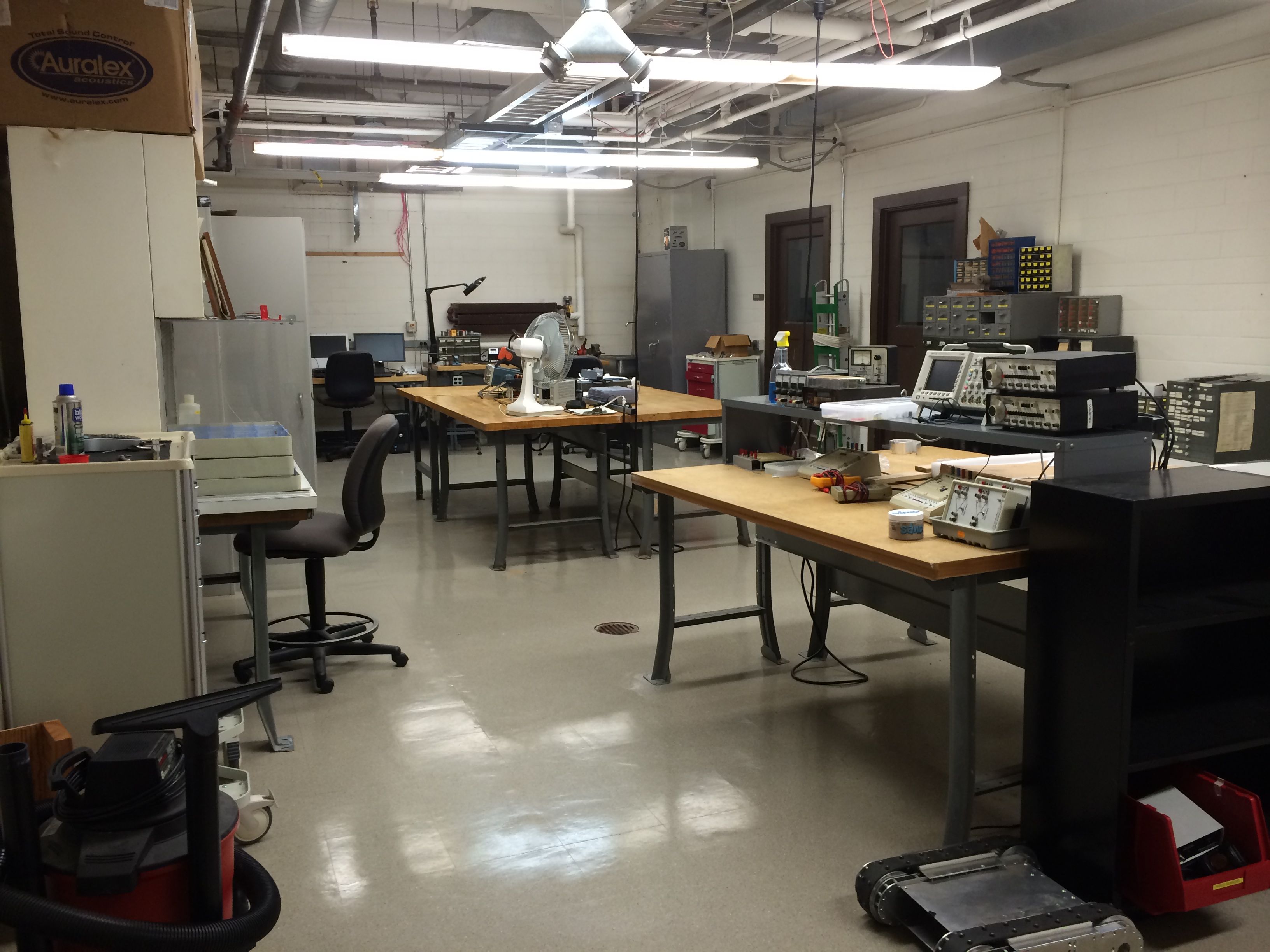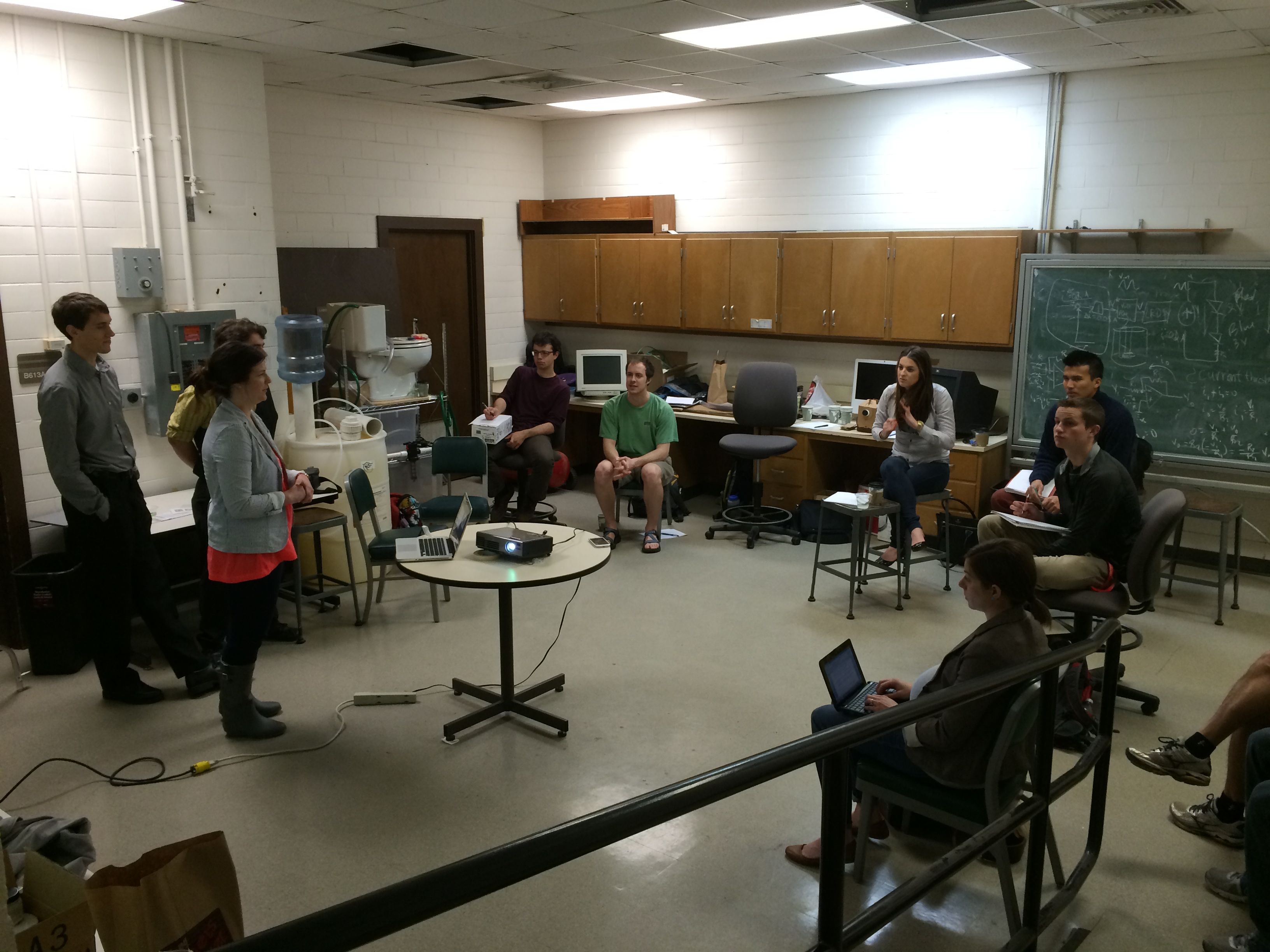|
Size: 3328
Comment:
|
← Revision 33 as of 2018-08-30 19:28:34 ⇥
Size: 6150
Comment:
|
| Deletions are marked like this. | Additions are marked like this. |
| Line 2: | Line 2: |
| {{attachment:GarageB651_3.jpg|GarageB651_3|width="400"}}{{attachment:GarageB651_1.jpg|GarageB651_1|width="400"}} {{attachment:GarageB651_2.jpg|GarageB651_2|width="400"}} | |
| Line 3: | Line 4: |
| Welcome to Garage Physics. Garage Physics is located in B613 Sterling Hall and sponsored by the University of Wisconsin Department of Physics with support from the UW Kemper Knapp Bequest, the Department of Physics Board of Visitors Fund for Undergraduate Research, and a grant from Venturewell.org. | |
| Line 4: | Line 6: |
| Welcome to Garage Physics. Garage Physics is located in B651 Sterling Hall and sponsored by the University of Wisconsin Department of Physics. The gestation of the project is described in the project proposal: [[attachment:GaragePhysicsProposal.pdf]] The goal of Garage Physics is to provide a new flexible space for innovative student-focused research and education. In the Garage, a student (undergraduate or graduate) is encouraged to explore his or her passions, to find new passions, to learn practical skills, to study in new ways, and to take an active role in their education. The Garage mode of learning compliments the structured learning environment of the regular curriculum. A wide variety of projects are possible in the Garage: basic scientific research, projects for entrepreneurs interested in developing or exploiting new gadgets, and "steAm" projects merging STEM and Arts fields. Projects related to sustainability, public safety, teaching and learning, and social entrepreneurship are encouraged. |
The goal of Garage Physics is to provide a new flexible space for innovative student-focused research and education. In the Garage, a student (undergraduate or graduate) is encouraged to explore his or her passions, to find new passions, to learn practical skills, to study in new ways, and to take an active role in his or her education. The Garage mode of learning compliments the structured learning environment of the regular curriculum. A wide variety of projects are possible in the Garage: basic scientific research, projects for entrepreneurs interested in developing or exploiting new gadgets, and "steAm" projects merging STEM and Arts fields. Projects related to sustainability, public safety, teaching and learning, and social entrepreneurship are encouraged. |
| Line 12: | Line 10: |
| 1) Register for the e-mail distribution list to receive notifications of meetings etc. Subscribe at http://mail.physics.wisc.edu/mailman/listinfo/Garage |
0) Email Brett Unks and Duncan Carlsmith with an introduction describing yourself, your major, your background, and what you hope to accomplish even if that is just to find out more at this stage. |
| Line 16: | Line 12: |
| 2) Access to the Garage requires safety training and is controlled by keys. Safety training is offered online. Self-register at LEARN@UW (click the self-registration link at the upper right of your screen and select Garage Physics) and read over the basic electrical safety tutorial. Take a look at the other materials also. Take the quiz. You must get a perfect score. You can try as many times as is necessary. Then meet with Brett Unks and Duncan Carlsmith to discuss your needs, and obtain a key from Aimee Lefkow. Remember, the buddy rule applies and will be enforced. | 1) Register for the e-mail distribution list to receive notifications of meetings etc. Subscribe at https://www.physics.wisc.edu/garage-subscribe . Join the Garage Physics group at https://groups.diigo.com/group/garage_physics using your xxx.wisc.edu email address to create a free account. You must request to join the group and email Carlsmith your Diigo ID and a brief introduction to be approved. You will find suggestions for projects on the Diigo group site and information related to ongoing projects and may post your own there. 2) Access to the Garage requires safety training. First read the safety information linked to the front page of the WIKI. Basic electrical safety training is required and is offered online. Self-register at https://canvas.wisc.edu/courses/73857/modules and read over the basic electrical safety tutorial. Take a look at the other materials also. Take the quiz. You must get a perfect score. You can try as many times as is necessary. Then meet with Brett Unks to discuss further your interests and needs. Access if provided during staff hours. We no longer supply keys. Consult staff for hours. Remember, the buddy rule applies and will be enforced. |
| Line 20: | Line 18: |
| 4) Edit the "People" page adding your name, then create a home page with your contact information and a photo. Note that this information is public read so exercise care. | 4) Look over the suggested and on-going projects and talk to the organizers/proponents about how to participate in or lead the effort. |
| Line 22: | Line 20: |
| 5) Look over the suggested and on-going projects and talk to the organizers/proponents about how to participate in or lead the effort. | 5) Look over the mini-classes. Express and interest or suggest a class and be sure to respond promptly when classes are announced via the e-mail distribution list. |
| Line 24: | Line 22: |
| 6) Look over the mini-classes. Express and interest or suggest a class and be sure to respond to Doodle polls when classes are announced via the e-mail distribution list. | 6) Consider enrolling in a directed independent study class for credit in which you take advantage of the Garage. See L&S Undergraduate Directed/Independent Study Course Guidelines https://kb.wisc.edu/ls/page.php?id=20133 and University guidlelines https://kb.wisc.edu/vesta/page.php?id=36263. Honors students may seek additional research funds through the Honors program. Many other opportunities may be found on this wiki for funding research and entrepreneurial activities. |
| Line 26: | Line 24: |
| 7) Consider enrolling in an independent study class for credit in which you take advantage of the Garage. Honors students may seek research funds through the Honors program. | 7) Attend a research meeting or brainstorm/pizza meeting. Meetings are announced via the email distribution list. Garage staff also post to the email list when they are working in Garage and available to meet with and/or assist you. A general open house is usually available during the first 2 weeks of each Fall and Spring semester. |
| Line 28: | Line 26: |
| 8) Join the Garage Physics Diigo group - see front page. | 8) Read this caution: Normal university rules regarding student integrity and etiquette apply in Garage Physics. Project work requires the blessing of Brett Unks. In particular, it is disallowed print any 3-D object without permission and which appears discriminatory, offensive, or hazardous. By participating in Garage Physics, you acknowledge its unusually public nature as an educational space. Descriptions and images of activity and work could appear on publicly accessible websites including the project pages on the wiki, in your poster presentations, in business competitions, and in presentations about Garage Physics. You may be encouraged to participate in public events on campus and beyond such as an outreach opportunity or hacker/maker faire. Students may be found working in Garage for credit or on a voluntary basis. Please consider your privacy and security in this context and the privacy and security of other participants and of their property. Discuss any concerns with Professor Carlsmith. |
| Line 30: | Line 29: |
| 9) Garage Physics offers limited support for R&D materials for scientists, innovators, and entrepreneurs. After discussion with Carlsmith, apply at the following link: https://www.physics.wisc.edu//GaragePhysicsVenturewellSupportApplication. | |
| Line 31: | Line 31: |
| 10) Once you have an idea of what you wish to do, prepare a research contract (http://www.webguru.neu.edu/undergraduate-research/structuring-ur-experience/research-learning-contracts), post it as a new Garage Project on the projects page, and seek an advisor/mentor/collaborator. |
About Garage Physics



Welcome to Garage Physics. Garage Physics is located in B613 Sterling Hall and sponsored by the University of Wisconsin Department of Physics with support from the UW Kemper Knapp Bequest, the Department of Physics Board of Visitors Fund for Undergraduate Research, and a grant from Venturewell.org.
The goal of Garage Physics is to provide a new flexible space for innovative student-focused research and education. In the Garage, a student (undergraduate or graduate) is encouraged to explore his or her passions, to find new passions, to learn practical skills, to study in new ways, and to take an active role in his or her education. The Garage mode of learning compliments the structured learning environment of the regular curriculum. A wide variety of projects are possible in the Garage: basic scientific research, projects for entrepreneurs interested in developing or exploiting new gadgets, and "steAm" projects merging STEM and Arts fields. Projects related to sustainability, public safety, teaching and learning, and social entrepreneurship are encouraged.
Take the following steps to join Garage Physics:
0) Email Brett Unks and Duncan Carlsmith with an introduction describing yourself, your major, your background, and what you hope to accomplish even if that is just to find out more at this stage.
1) Register for the e-mail distribution list to receive notifications of meetings etc. Subscribe at https://www.physics.wisc.edu/garage-subscribe . Join the Garage Physics group at https://groups.diigo.com/group/garage_physics using your xxx.wisc.edu email address to create a free account. You must request to join the group and email Carlsmith your Diigo ID and a brief introduction to be approved. You will find suggestions for projects on the Diigo group site and information related to ongoing projects and may post your own there.
2) Access to the Garage requires safety training. First read the safety information linked to the front page of the WIKI. Basic electrical safety training is required and is offered online. Self-register at https://canvas.wisc.edu/courses/73857/modules and read over the basic electrical safety tutorial. Take a look at the other materials also. Take the quiz. You must get a perfect score. You can try as many times as is necessary. Then meet with Brett Unks to discuss further your interests and needs. Access if provided during staff hours. We no longer supply keys. Consult staff for hours. Remember, the buddy rule applies and will be enforced.
3) Join the WIKI at https://www.physics.wisc.edu/garage. Click "login" then "you can create one now" to create an account. (Ask Brett for the answer to the TextCha.) The WIKI will be our preferred place for sharing information including requests for experiment setups and equipment. Take a look at existing pages in text edit mode to understand how to edit pages. Hint: If you clone a photo or other attachment link, it will first appear as a clickable link. Clicking that link will prompt you to upload a file.
4) Look over the suggested and on-going projects and talk to the organizers/proponents about how to participate in or lead the effort.
5) Look over the mini-classes. Express and interest or suggest a class and be sure to respond promptly when classes are announced via the e-mail distribution list.
6) Consider enrolling in a directed independent study class for credit in which you take advantage of the Garage. See L&S Undergraduate Directed/Independent Study Course Guidelines https://kb.wisc.edu/ls/page.php?id=20133 and University guidlelines https://kb.wisc.edu/vesta/page.php?id=36263. Honors students may seek additional research funds through the Honors program. Many other opportunities may be found on this wiki for funding research and entrepreneurial activities.
7) Attend a research meeting or brainstorm/pizza meeting. Meetings are announced via the email distribution list. Garage staff also post to the email list when they are working in Garage and available to meet with and/or assist you. A general open house is usually available during the first 2 weeks of each Fall and Spring semester.
8) Read this caution: Normal university rules regarding student integrity and etiquette apply in Garage Physics. Project work requires the blessing of Brett Unks. In particular, it is disallowed print any 3-D object without permission and which appears discriminatory, offensive, or hazardous. By participating in Garage Physics, you acknowledge its unusually public nature as an educational space. Descriptions and images of activity and work could appear on publicly accessible websites including the project pages on the wiki, in your poster presentations, in business competitions, and in presentations about Garage Physics. You may be encouraged to participate in public events on campus and beyond such as an outreach opportunity or hacker/maker faire. Students may be found working in Garage for credit or on a voluntary basis. Please consider your privacy and security in this context and the privacy and security of other participants and of their property. Discuss any concerns with Professor Carlsmith.
9) Garage Physics offers limited support for R&D materials for scientists, innovators, and entrepreneurs. After discussion with Carlsmith, apply at the following link: https://www.physics.wisc.edu//GaragePhysicsVenturewellSupportApplication.
10) Once you have an idea of what you wish to do, prepare a research contract (http://www.webguru.neu.edu/undergraduate-research/structuring-ur-experience/research-learning-contracts), post it as a new Garage Project on the projects page, and seek an advisor/mentor/collaborator.
Navigation links will appear as you browse this site. Use the "Front Page" button to return to the front page.
Cheers,
Duncan Carlsmith, Professor of Physics, University of Wisconsin-Madison, duncan@hep.wisc.edu